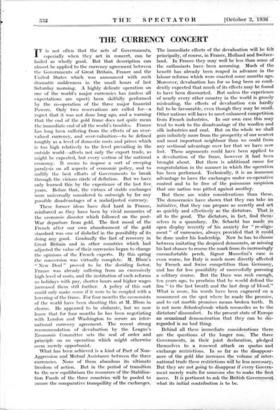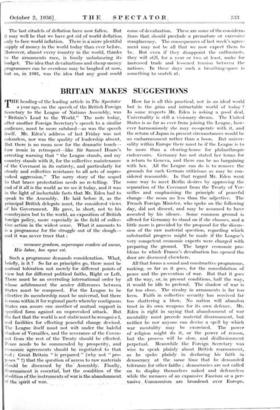THE CURRENCY CONCERT
IT is not often that the acts of Governments, I especially when they act in concert, can be hailed as wholly good. But that description can almost be applied to the currency agreement between the Governments of Great Britain, France and the United States which was announced with such dramatic suddenness in the small hours of last Saturday morning. A highly delicate operation on one of the world's major currencies has (unless all expectations are upset) been skilfully performed by the co-operation of the three major financial Powers. Only two reservations are called for—a regret that it was not done long ago, and a warning that the end of the gold franc does not quite mean the immediate end of all the world's troubles. France has long been suffering from the effects of an over- valued currency, and over-valuation—to be defined roughly as a level of domestic costs and piices which is too high relatively to the level prevailing in the outside world—affects not only the export trade, as might be expected, but every section of the national economy: It seems to impose a sort of creeping paralysis on all aspects of economic policy, and to nullify the best efforts of Governments to break through the vicious circle of deflation. But we have only learned this by the experience of the last five years. Before that, the virtues of stable exchanges' were universally considered to outweigh by far any possible disadvantages of a maladjusted currency.
These former ideas have died hard in France, reinforced as they have been by vivid memories of the economic disaster which followed on the post- War departure from gold. The first Mood of the French after our own abandonment of the gold standard was one of disbelief in the possibility of its doing any good. Gradually the fact of recovery in Great Britain and in other countries which had adjusted the value of their currencies' began to change the opinions of the French experts. By this spring the conversion was virtually complete. M. Blum's " New • Deal " proved to be the" deciding factor. France was already suffering from an excessively high level of costs, and the institution of such reforms as holidays with pay, shorter hours and higher wages increased them still further. A policy of this sort could only make sense if it were to be coupled with a lowering of the franc. For four months the economists Of the world have been shouting this at M. Blum in chorus. He appeared to be obdurate, but we now know that for four months he has been negotiating with London and Washington to secure an inter- national currency agreement. The recent strong recommendation of devaluation by • the League's Economic Committee sets the seal of order and principle on an operation which might otherwise seem merely opportunist.
What has been achieved is a kind of Pact of Non- Aggression and Mutual Assistance between the three currencies. None of them abandons its ultimate freedom of action. But in the period of transition to the new equilibrium the resources of the Stabilisa- tion Funds of the three countries will be pooled to ensure the comparative tranquillity of the exchange's. The immediate effects of the devaluation will be felt principally, of course, in France, Holland and Switzer- land. In France they may well be less than some of the enthusiasts have been assuming. Much of the benefit has already been reaped in advance in the labour reforms which were enacted some months ago. Moreover, devaluation has for so long been so confi- dently expected that much of its effects may be found to have been discounted. But unless the experience of nearly every other country in the world is grossly misleading, the effects of devaluation can hardly fail to be favourable, even though they may be small. Other nations will have to meet enhanced competition froth French industries. In our own case this may tend to work to the disadvantage of the woollen and silk industries and coal. But on the whole we shall gain infinitely more from the prosperity of our nearest and most important neighbour than we could froth any sectional advantage over her that we have now lost. These arguments could have been applied to a devaluation of the franc, however it had been brought about. But there is additional cause for congratulation in the manner in which the operation, has been performed. Technically, it is an immense advantage to have the exchanges under co-operative control and to be free of the poisonous suspicion that one nation was pitted against another.
But there are wider considerations than these. The deniocracies have shown that they can take an initiative, that they can prepare as secretly and act as quickly and effectively as "the' dictators. That is all to the good. The dictators, in fact, find them- selves in a quandary. Dr. Schacht has made an open display recently of his anxiety for " re-align- ment " of currencies, always provided that it could be done under his leadership. Now he has to choose between imitating the despised democrats, or missing his last chance to rescue the mark from its increasingly uncomfortable perch. Signor Mussolini's case is even worse, for Italy is much more directly affected by French and Swiss competition than Germany, and has far less possibility of successfully pursuing a solitary course. But the Duce was rash enough, ten years ago, to proclaim that he would defend the lira " to the last breath and the last drop of blood." What is more, his words have been engraved on a • monument on the spot where he made the promise, and to eat marble promises means broken teeth. It is not mere Schadenfreude which reconciles us to the dictators' discomfort. In the present state of Europe an occasional demonstration that they can be dig- regarded is no bad thing.
Behind all these immediate considerations there are the questions of the longer run: The three Governments, in their joint declaration, pledged themselves to a renewed attack on quotas and exchange restrictions. In so far as the disappear- ance of the gold bloc increases the volume of inter-_ national trade these restrictions will be less necessary. But they are not going to disappear if every Governr ment merely waits 'for sinneone else to make the first Move. It is pertinent to ask the British Government what its initial contribution is to be. The last citadels of deflation have now fallen. But it may well be that we have got rid_ of world deflation, only to face world inflation. Theire is amore plentiful supply of money in the world today than ever before. Moreover, almost every Country in the world, thanks_ to the armaments race, is busily : unbalancing its budget. The idea that devaluations and cheap money programmes can be overdone may be- laughed at now, but .so, in 1931, was the idea that any good could come of devaluation. These are some of the considera- tions that, should preclude a premature or excessive cbmplacency. The consequences of last week's agree- ment may not be all that we now expect them to be. But even if they disappoint the enthusiasts, they will still, for a year or two at least, make for increased trade and lessened tension between the nations. In these days such a breathing-space is something to snatch at.











































 Previous page
Previous page